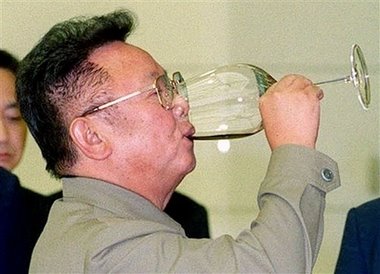What Would Jesus Drink?
Wednesday, November 12, 2008
Saturday, October 14, 2006
Monday, October 09, 2006
Forgive Me for I Have Sinned...Big Time
What penance would Jesus dish? Post Modern Prohibition Watch I:
Spin the Bottle - Mark Foley's 10-step rehab program.
By William Saletan
Slate Magazine
Bad news: You've been caught (a) taking bribes from Jack Abramoff, (b) telling a police officer that "the Jews are responsible for all the wars in the world," or (c) exchanging naked fantasies with teenage boys. What do you do? If you're Mel Gibson, Rep. Bob Ney (R-Ohio), or former Rep. Mark Foley (R-Fla.), you blame alcohol. Here's their 10-step program for rehabilitating your career.
1. Take "full responsibility." This is crucial. Only by accepting blame in principle can you shift it in practice. After being caught in the Abramoff scandal, for example, Ney issued a statement that pledged "to accept responsibility for what I have done" and then segued to his "dependence on alcohol." Gibson's statement, released after his anti-Semitic rant during a drunk-driving arrest, opened with the excuse and then segued to responsibility: "After drinking alcohol on Thursday night, I did a number of things that were very wrong."
Foley's statement takes the Gibsonian approach. "Painfully, the events that led to my resignation have crystallized recognition of my longstanding significant alcohol and emotional difficulties," he begins in the third-person passive. After two more paragraphs on his "disease" and his "treatment for alcoholism," he vows to "accept full responsibility for the harm I have caused." In press conferences, Foley's spokesman, David Roth, smoothly blends the rhetoric of responsibility with the chemistry of excuses: "Based upon the experts that I have spoken to, the combination of alcohol [and] mental illness can result in inappropriate conduct, which Mark Foley has fully accepted responsibility for."
--------------------------------------------------------------------------------
--------------------------------------------------------------------------------
2. Confess that the disease is bigger than you. This is no time for arrogance. Only by expressing humility and weakness can you feign inability to control your behavior. Thus, Gibson puzzled over slurs that were "blurted out in a moment of insanity," seemingly against his will. Likewise, Roth portrays Foley as a casualty of a natural disaster: "The recent tragic events that led to Mark's recognition that he is ill and that his alcoholism and mental illness are beyond his control reached a crisis point on Friday."
3. Depict the drunken you as a stranger. According to the sober Gibson, the plastered Gibson "said things that I do not believe to be true." In a second statement, Gibson added with pained innocence, "I am in the process of understanding where those vicious words came from during that drunken display." Similarly, Roth suggests there are two Foleys: "The communications that he made while under the influence of alcohol … are not the product of the Mark Foley—the sober and healthy Mark Foley—but are the product of someone under the influence of alcohol and suffering from mental illness."
4. Call yourself an alcoholic. Foley adopts the label directly: "I am an alcoholic." This is vital, because when you're also a crook, anti-Semite, or pervert, "alcoholic" sounds so much nicer. Millions of people are alcoholic or love someone who's alcoholic. Embrace the label, and they'll embrace you. Roth adds a nifty twist to this maneuver, calling Foley "a closet drinker." Everyone knows Foley had a closet. The only question is what's in it. Booze is the least shocking answer he can hope to get away with.
5. Duck and recover. It's no fun explaining why you sold your vote for casino chips or asked an underage lacrosse player what he does in the nude. Your best move is to disappear into the nearest substance-abuse clinic, where you can "recover" until the media pack has moved on. That's what Ney did when reporters demanded to know whether he'd resign. "He is taking things one step at a time," Ney's lawyer told them. Roth brushes aside questions about Foley's fate the same way. "Those issues will be dealt with when Mark's treatment hopefully results in his recovery," he says. "He's in treatment" sounds so much better than "no comment."
6. Ask for help. If you're the villain in the present drama, replace it with a new drama in which you're the victim. "I am asking the Jewish community, whom I have personally offended, to help me on my journey through recovery," said Gibson. "Over the years, I have worked to help others, but now I am the one that needs help," said Ney. Now Foley needs help, too. "The focus of our work," says Roth, "has been exclusively dedicated to getting Mark the help that he acknowledged that he needed and could not deal with on his own."
7. Medicate promptly. No one will believe you if you promise to stop hating Jews, taking bribes, or flirting with boys tomorrow. Reform takes time. But recast your character problem as a substance problem and you can "treat" it right away. "I have begun an ongoing program of recovery," Gibson announced four days after his slurs became public. It worked: By the time he came up for sentencing, the judge gave him credit for having "'already engaged in an extensive amount of rehabilitation." Ney took the same approach, embracing "professional help" for his "dependency." Foley, moving even more quickly, has announced his "immediate treatment for alcoholism and related behavioral problems." The story of what you did may get worse, but the story of your "treatment" always gets better.
8. Take credit for fighting your addiction. While blaming your sins on factors beyond your control, don't hesitate to frame your flight to the clinic as an act of courage and free will. "I have battled the disease of alcoholism for all of my adult life," Gibson declared. Foley, too, is a hero. "Mark voluntarily entered a substance abuse and mental health facility," says Roth. "This decision was Mark's … This was a life decision, not a tactical one made by others."
9. Compartmentalize the problem. While using alcohol to explain away everything from golf junkets to selling commercial endorsements in the Congressional Record, never admit to drinking on the job. Remember, alcohol pervaded your life but not your schedule. Despite amorous instant messages in which Foley tells a young man "we are still voting" and "I better go vote," Roth insists Foley "was never under the influence of alcohol while he was a public servant." Instead, Foley drank only "alone" and "at night."
10. Add excuses as needed. Two days after declaring himself an alcoholic, Foley announced that as a boy, he had been molested by a clergyman. "Mark does not blame the trauma he sustained as a young adolescent for his totally inappropriate emails and IM's. He continues to offer no excuse whatsoever for his conduct," said Roth. But the spokesman continued: "As is so often the case with victims of abuse, Mark advises that he kept his shame to himself for almost 40 years." Who needs a scapegoat when you've got a "trauma" that recasts you as the "victim"? The most powerful excuses are those you never call by that name.
Wednesday, April 19, 2006
Friday, April 14, 2006
Red Hands of Salome
Prince Herod was a bad little prince. Although married, while galavanting in Rome, he fell in love and impregnated his neice, Herodias, and took her back to Galilee. (In modern terms, this would probably be a juvenile incest felony, with a kidnapping count to boot.) Even by the lax standards of these bibical bad-boys, Herod was bad. John the Baptist scolded Herod publicly for his adultery.
In one of the earliest examples of the Stockhold Syndrome, Herodias decided to get even with John the Baptist for the reproach.
At Herod's birthday, everyone was drunk.
It is a tragedy of history that the varietal and vintage was not recorded.
Herodias sent in her daughter, Salome, who did a dance for Herod. That must have been some lapdance she gave her ... father. (Yikes...) Herod offered to grant her any gift she wanted. It's not quite clear that Herodias had this completely figured out in advance, but hey its a good, lascivious story, so let's continue....
Salome asked her scheming mother Herodias what wish she should make, and Herodias whispered, "The head of John to Baptist."
Salome dutifully told her Papa, what Mama had suggested. John the Baptist's head was promptly cut off.
Anyway, Salome was likely hot, but Herodias must have been absolutely scorching hot.

<--- Herodias the Hot Head

Salome the Saucy Daughter -->
Saturday, February 11, 2006
Actual Conversation I
Hey, Jesus.
-Hmmmph.
Hey, Jesus.
-Hmmph.
Dude!
-What?
Which was better, the '53 La Mission Haut Brion, or the '61 Latour?
-The '53 La Mission, but only 'cuz the Latour was slightly corked.
But you liked the Latour, right?
-Good, but not great.
Will you turn those Arrowhead water bottles in the garage into '53 La Mission?
-No, I won't.
Thursday, January 05, 2006
Heal the Drunk With Wine
Maybe Jesus knew that "wine cures." It took us 2000 more years to learn that?
Study toasts free drinks for homeless alcoholics
Jan 05 12:05 AM US/Eastern
Free drinks may improve the health and lives of homeless alcoholics and reduce their run-ins with police, according to a study published in the Canadian Medical Association Journal.Seventeen chronic alcoholics who drank upwards of 46 glasses a day over the past 35 years, including cheap substitutes such as mouthwash that often led to unconsciousness, were offered a glass of wine or sherry each hour, from 7:00 am to 10:00 pm at an Ottawa shelter over five to 24 months.
..."[As a result of the program], three quit, three died of alcohol-related disease before the end of the study, but 11 others reported "a markedly decreased consumption of beverage and non-beverage alcohol, and most reported improved sleep, hygiene, nutrition and health," according to the authors of the study.
" ... 'Once the craziness of their alcoholism is under control, their wasted lives on the street turned around, they're interesting people and all that destructive behavior is behind them. They'll never be fully integrated into society, but they'll be less of a drain and even contributors. By giving them alcohol in modest and controlled amounts, we've been able to minimize the harm they do to themselves and work on their bad behavior.' "







